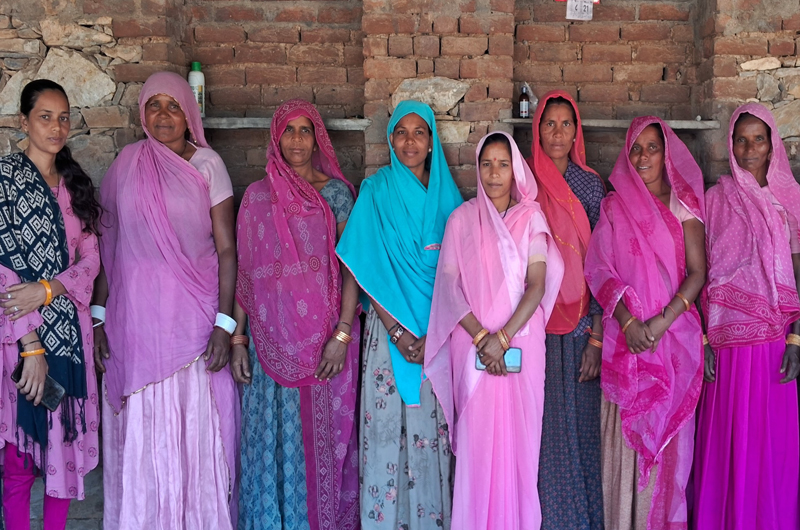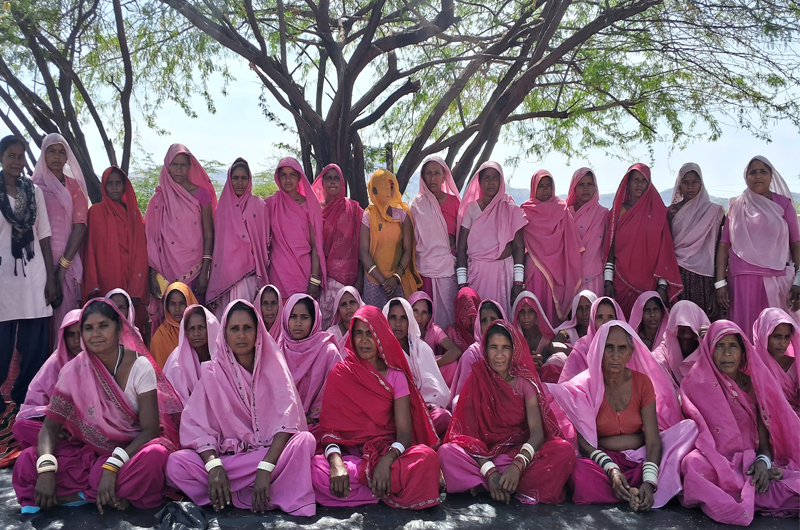Tribal and Adivasi women, organised as self-help groups of various strengths, are gaining in knowledge, capabilities and assertiveness, contributing to both economic and social welfare in Rajasthan’s Pali and Udaipur Districts. Bharat Dogra talks to some of the women who are actively engaged in the initiative
By pooling their savings regularly every month, self-help groups (SHGs) in many parts of India have improved their economic and social security. However, rural women in particular have been able to achieve more when they have combined this effort with wider initiatives for social reform. In Bali Block of Rajasthan’s Pali District, this combination of economic and social initiatives has yielded encouraging results.
Various small SHGs here have merged to create a bigger group at the village or panchayat level. Called Sankul groups, these too merge to form a federation called Ghoomar Mahila Samiti. Such a federation has about 5,000 members across 32 villages in Pali and Udaipur Districts. At another level several women producer groups involved in collection and processing of minor forest produce have got together to form a producer company known as the Ghoomar Mahila Producer Company. Conversations with several members of these various groups, mostly women from the Garasia tribal or Adivasi Community, were enlightening.
In Gordhanpur Village, several members of the Warliya Mahadev Sankul Group recounted their positive experiences at a monthly meeting. “Earlier, we had to borrow at high interest rates from private moneylenders; we also had to pledge our ornaments and sometimes even land. Now, due to the savings which our groups have been able to achieve, this dependence on private moneylenders has been replaced by a confidence that we can get a loan on much easier terms whenever we need to,” says Sanibai, one of the women.

Others shared that the rich moneylenders had initially opposed attempts to form big groups, and only when they were threatened with exposure of their land-grab and exploitative practices, did they stop doing so. Now, the interest the group members pay remains within their group, in a sense adding to their own economic strength and savings. The corpus fund of the Warlia Group has gradually grown to Rs. 1.2 million. The group also has links with banks so that its capacity to arrange loans at low interest rates for members is high.
Asked how they utilised the loans, the women said the funds have helped them improve farming and irrigation, purchase dairy animals and start small shops and enterprises (for example, a small-scale flour mill). No less important for them is the fact that they could arrange for the medical treatment of family members, or meet wedding expenses, without getting caught in high-interest debt.
Besides discussing financial issues, the group meetings also help address various social concerns, including child marriage and domestic violence. These loans provided the means for better and higher education, especially for girls and women. Kamli Bai says she is not only sending her daughter, but also her two daughters-in-law, to college. A few years ago, educating daughters-in-law would have been almost unheard of, and this change is a part of the wider social changes in which these women’s groups have played an important role. While earlier it was difficult for women to attend social meetings, now they attend group meetings and other assemblies unhindered, and some of them were even called for pre-budget consultations by government authorities.
Members of the Bharat Mata Sankul of Thandi Beri Village also reports similar progress. Kheemi said her family was in quite a precarious condition economically, but she worked hard to finish her BA, and took up some work. With the help of a loan from the group, she was able to arrange for her husband’s education, leading to him becoming a school teacher. All this helped improve the family’s finances. Several members are getting more non-timber forest produce-related work and this has also improved their economic status.
Women of these groups have worked to check the increase in alcoholism in their communities too. They participate more actively in gram panchayat and gram sabha activities and meetings. They have better interaction with various institutions including banks. Recently, when some bank officials were rude to them, the women presented a united front in demanding an apology, and the officials hastily corrected their ways. Several such small incidents indicate the growing assertiveness and capability of these women from Adivasi/tribal communities.
The initial mobilisation and capacity building work for this effort was carried out by a voluntary organization called SRIJAN (Self Reliant Initiatives through Joint Action). After significant progress was achieved, SRIJAN implemented its exit policy, allowing the community organisation to function on its own. However, Deepak Saini, project leader of SRIJAN, says the organisation continues to be deeply engaged with the group’s progress and provides technical or other support when needed. Saddam Husain Chisti, the CEO of Ghoomar Mahila Samiti, is full of ideas to take the initiative forward, and is keen that there should be growing convergence of the sister organisations.
(The writer is a senior freelance journalist and author who has been associated with several social movements and initiatives. He lives in New Delhi.)



 from Webdoux
from Webdoux